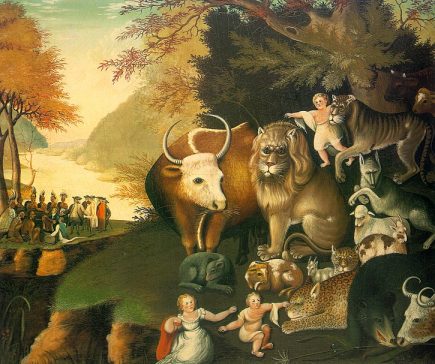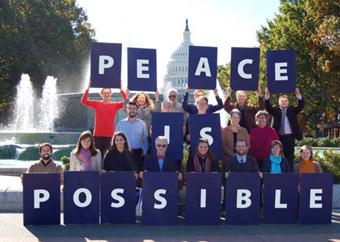Who Are Friends?
The Religious Society of Friends, also known as Quakers, arose in England in the mid-1600s during the religious ferment of the Protestant Reformation.
Quakers were empowered to become a movement by personal experiences that revealed the spiritual truth found in the Gospel of John, Chapter 1: that Christ is the true Light that enlightens every man.
For more than 350 years Friends’ tradition has affirmed the spiritual unity of all people.
We cherish the belief that there is that of God in each person, leading us to respect the worth and dignity of all. The Light is present in every human and we seek to embrace it without distinction. This same Light enlightened Jesus of Nazareth and enlightened all great teachers of wisdom. This fact is true regardless of a person’s physical traits or cultural particulars—ethnicity, skin color, gender, sexual orientation, political belief, illness, ability or disability, legal status, or any other distinctions that are commonly drawn to divide people.
Peaceable Kingdom by Edward Hicks, 1834
We are all equal in the sight of God. American Friends witnessed this equality in the 17th century by recognizing both male and female ministers in their meetings—in the 18th century by striving for peaceful and fair relations with Native Americans—in the 19th century by efforts to resist and abolish slavery—in the 20th century in the movement for women’s suffrage and racial desegregation. In the present, Friends witness equality by welcoming LGBTQ+ people to full participation in society, including marriage. We welcome immigrants regardless of citizen status and affirm their human rights. In all centuries, Friends have opposed war and maintained a commitment to nonviolent engagement as the surest path to resolving conflict.
Friends believe that this Light is accessible to all without exception. We believe that the Inward Christ dwells inside each person – the Inner Light – a Seed of Truth planted in each mind and heart by the Divine. As seekers after God, we have no need for mediation by pastors, rituals or scriptures. The Inner Light is present in each person, sufficient for salvation and for growth in truth, goodness, peace, unity, and love – providing one continues to strive to be obedient to its leadings.
For Friends, the movement towards the inner life of contemplation and prayer has been balanced by the movement outwards to participate fully in the larger society. We strive to live as fully as possible according to Friends testimonies of Simplicity, Peace, Integrity, Community, Equality and Stewardship, known as the Six Spices.
Shepherdstown Friends Meeting aspires to be a loving community inclusive of the wide diversity of the surrounding national community. Each member and attender has the responsibility to foster that welcoming spirit. We acknowledge that the achievement of our spiritual goals is a lifelong process. Our goal of seeking unity will succeed in proportion to our willingness as individuals to honor our differences as we seek truth and to resist prejudice, discrimination, and injustice. Our ability to do that will succeed in proportion to our ability to seek and find that of God in everyone.
Friends Worship
Direct communication with God constitutes the essential life of the Meeting for Worship.
Our Meetings lack the décor, music, ceremony, prayers and sermons commonplace in other Christian denominations. Waiting in silent expectation is the basis of our Meeting for Worship. This approach follows from Friends’ belief in the universality of the Inner Light. Our Meeting for Worship is a quiet time with our hearts and minds open to the Divine. We believe that the Spirit of God (or the Inner Light) will lead, teach, and heal us as the Truth continues to be revealed.
Unprogrammed Friends Meetings proceed with no preset program.
Friends do not have visible sacraments. We have no baptism, except the spiritual baptism that occurs inwardly. We have no Creed, except the wordless law of love written in our hearts. We have no Ministers. Our Ministry is that which each of us brings to the group. Our communion is the mystical communion of one with all, and all with one, that the presence of God brings.
Vocal Ministry
Friends aspire to vocal ministry that arises out of a sense of being inwardly moved to share a Divine message aloud.
If you feel arising in your consciousness a message which is intended for more than yourself alone, we encourage you to deliver that message. Divinely inspired messages are not about the ego – they are not full of self, the need to be admired, the desire to show off one’s erudition, cleverness or rhetorical skill. But it is understandable and appropriate that messages be rooted in the truth of personal experience. No Friend should come to a Meeting for Worship with the intention to speak, or intention not to speak.
From its beginnings, Quakers have recognized men and women as equals in Ministry and in witness of the Testimonies.
Some Friends who are long-time members or steady attenders rarely, if ever, have been led to minister and it is not unusual for a Meeting to be totally silent. Although no messages may have been spoken in Meeting, the silent ministry of the Spirit moving in the midst of the gathered worshipers can be profound.
Quaker Decision Making
Shepherdstown Meeting follows a decision-making process common to many Quaker meetings.
Decision making takes place in a Meeting for Worship with Attention to Business. Unlike the decision-making processes that are common in other parts of our lives, we do not rely on majority rule, compromise, rationalism, rhetoric, or Robert’s Rules of order.
Although Friends’ tradition of decision making has been compared to consensus, it is not that. It is the Sense of the Meeting discerned by all in attendance. The Sense of the Meeting is arrived at by diligent listening to the still small voice that speaks in each of us, knowing from experience that it is a sure guide, both individually and collectively. Friends’ decision-making depends on trust in one another, love for one another, and patience. We trust that through listening to each other and opening ourselves to the Light in each of us, our collective decisions will be spirit led. Just as it is in Meetings for Worship so it is in Meetings for Business that the listening part of discussion is more vital than the speaking part.
Quaker methods do not have a natural feel for those of us who are new to Quakerism. In reaching for and arriving at a collective decision, we rely on the Divine. We debate, yes, but we do not strive to overpower others whose ideas differ from our own, not through emotional appeal, superior logic nor subtle threats. We listen carefully. If discussion becomes difficult or contentious, we settle into the silence, seeking divine guidance to assimilate the thoughts that have been shared.
In considering the items of the agenda, we seek for a collective decision in accordance with the Spirit moving in the present. Unity and clarity are the goals – whether the matter be the use of money, public witness against social injustices, or giving sanctuary to the needy. Divine guidance is vital to finding the sense of the meeting.
Our Meeting’s Library
Shepherdstown Friends Meeting’s Library is located at the Telfair home.
Our library is organized into 12 sections:
-
- Quaker History
- Quaker Biographies & Profiles
- Quaker Journals & Essays
- Faith & Practice/Quakerism
- Quaker Fiction, Poetry, Humor, etc.,
- Quaker Education
- Quaker Children & Youth
- Peace & Social Justice
- Spirituality & Inspiration
- The Bible & Christianity
- World Religions, and
- Pendle Hill Pamphlets.
Borrowing Procedure
- You will notice an index card near or at the back of each book (pamphlets* excepted).
- If you wish to take the book away from the Library, please note your name as “Borrower” along with the current date.
- Place your card in the “Out Box” on the table.
- When book is returned, just check the “Return” column, replace the card in the book, and put it back on the appropriate shelf.
That’s it! There is no due date or fine system; we just want to know where a book might be found if another Friend wants to locate it.
Books may be returned directly to a Telfair at the library or at Meeting.
Pamphlets may be taken out as well as books. Only the numbered Pendle Hill Pamphlets appear in the Library Catalog. Any Friend may borrow pamphlets as they choose – just bring it back to the library at your convenience.
You are welcome at the library; just call first to see if we are available. Our phone numbers are (408) 315-8027 (Carole) or (408) 966-8895 (Bill). We can also bring books to you at Meeting if that is more convenient.
Our Friend's Library
Click here to View and Download a PDF of Our Library Catalog



